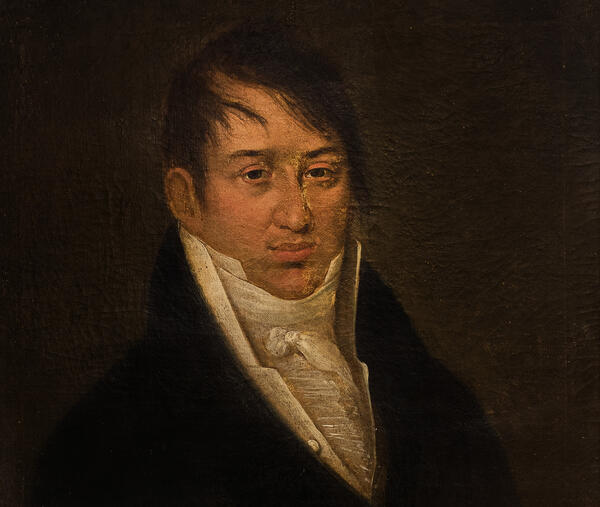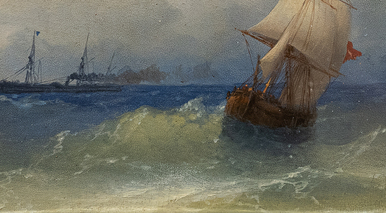An unknown artist painted the portrait of Konstantin Zlobin, the son of merchant and philanthropist Vasily Zlobin, in the early 19th century. There is an inscription on the back of the painting, ‘To my collaborator Vasily Baryshnikov 1807’.
Konstantin Zlobin was born in the village of Malykovka in 1771. Vasily Zlobin wanted to give his son a special upbringing, and his mother Pelageya, despite her adherence to Old Believers’ traditions, did not interfere. Young Konstantin was sent to Sarepta, one of the first German colonies in the Volga region.
German colonies in the Volga region appeared in the second half of the 18th century with the permission of Empress Catherine II. German settlers were allowed to occupy the empty land, and they were exempt from military service and high taxes. From 1764 to 1768, the Germans founded 106 colonies on the left bank of the Volga, which were inhabited by about 25 thousand people. By 1865, the population had increased several times.
In Sarepta, Konstantin Zlobin was brought up in the Moravian Herrnhut brotherhood, a Protestant Lutheran community. He became acquainted with German religious and philosophical literature, learned several languages, and formed his own idea of religion, for which the archpriest Nikolay Skopin considered him a freethinker.
At the age of 18, Zlobin began serving in the office of Procurator-General Alexander Vyazemsky and went on to have a career in the Ministry of Justice under the poet Gavriil Derzhavin. The two became friends, and Zlobin showed interest in literature, which was inspired by Derzhavin.
Konstantin Zlobin retired on 19 February 1805 with the rank of the collegiate counselor. It was enough to receive the hereditary nobility status. In 1808, Zlobin was awarded the Order of Saint Vladimir of the fourth class for a major donation to a shelter for elderly barge haulers.
Konstantin Zlobin was married twice. His first marriage to an Englishwoman Marianne Stevens was unsuccessful: they separated after six months, and Zlobin went to Volsk, where he took care of his father’s business. After the death of his first wife, he married Vera Trifonova, daughter of Kuznetsk town governor. They had two daughters Yelena and Olga, and son Konstantin, who was born after Zlobin’s death in 1813.
For a long time, Konstantin Zlobin’s poems were unknown. In 1915, the Imperial Public Library accidentally acquired a bound notebook, titled on the inside cover ‘A Collection of Works by K. V. Zlobin. Volsk.’ The manuscript contained 132 sheets, on which 54 poems were preserved, rewritten by the author with his own corrections and additions. The poems were dated 1803–1810. The manuscript is kept in the Russian National Library in St. Petersburg in the collection of Gavriil Derzhavin.
Konstantin Zlobin was born in the village of Malykovka in 1771. Vasily Zlobin wanted to give his son a special upbringing, and his mother Pelageya, despite her adherence to Old Believers’ traditions, did not interfere. Young Konstantin was sent to Sarepta, one of the first German colonies in the Volga region.
German colonies in the Volga region appeared in the second half of the 18th century with the permission of Empress Catherine II. German settlers were allowed to occupy the empty land, and they were exempt from military service and high taxes. From 1764 to 1768, the Germans founded 106 colonies on the left bank of the Volga, which were inhabited by about 25 thousand people. By 1865, the population had increased several times.
In Sarepta, Konstantin Zlobin was brought up in the Moravian Herrnhut brotherhood, a Protestant Lutheran community. He became acquainted with German religious and philosophical literature, learned several languages, and formed his own idea of religion, for which the archpriest Nikolay Skopin considered him a freethinker.
At the age of 18, Zlobin began serving in the office of Procurator-General Alexander Vyazemsky and went on to have a career in the Ministry of Justice under the poet Gavriil Derzhavin. The two became friends, and Zlobin showed interest in literature, which was inspired by Derzhavin.
Konstantin Zlobin retired on 19 February 1805 with the rank of the collegiate counselor. It was enough to receive the hereditary nobility status. In 1808, Zlobin was awarded the Order of Saint Vladimir of the fourth class for a major donation to a shelter for elderly barge haulers.
Konstantin Zlobin was married twice. His first marriage to an Englishwoman Marianne Stevens was unsuccessful: they separated after six months, and Zlobin went to Volsk, where he took care of his father’s business. After the death of his first wife, he married Vera Trifonova, daughter of Kuznetsk town governor. They had two daughters Yelena and Olga, and son Konstantin, who was born after Zlobin’s death in 1813.
For a long time, Konstantin Zlobin’s poems were unknown. In 1915, the Imperial Public Library accidentally acquired a bound notebook, titled on the inside cover ‘A Collection of Works by K. V. Zlobin. Volsk.’ The manuscript contained 132 sheets, on which 54 poems were preserved, rewritten by the author with his own corrections and additions. The poems were dated 1803–1810. The manuscript is kept in the Russian National Library in St. Petersburg in the collection of Gavriil Derzhavin.


